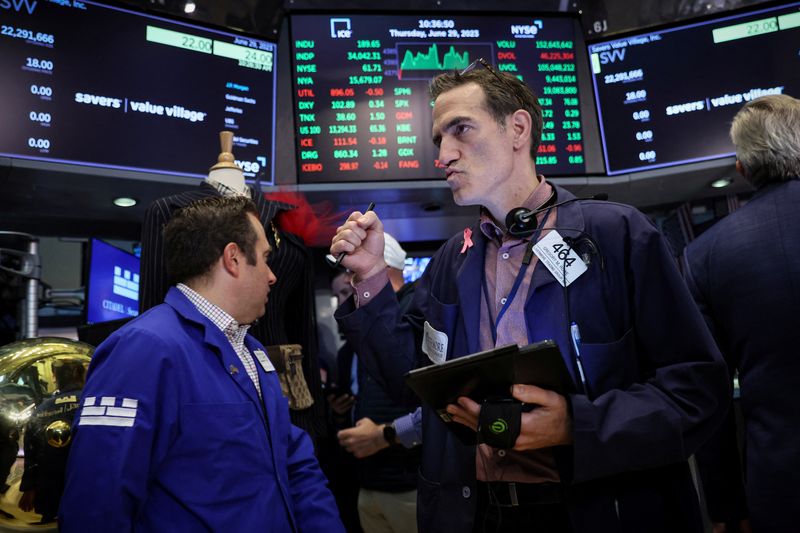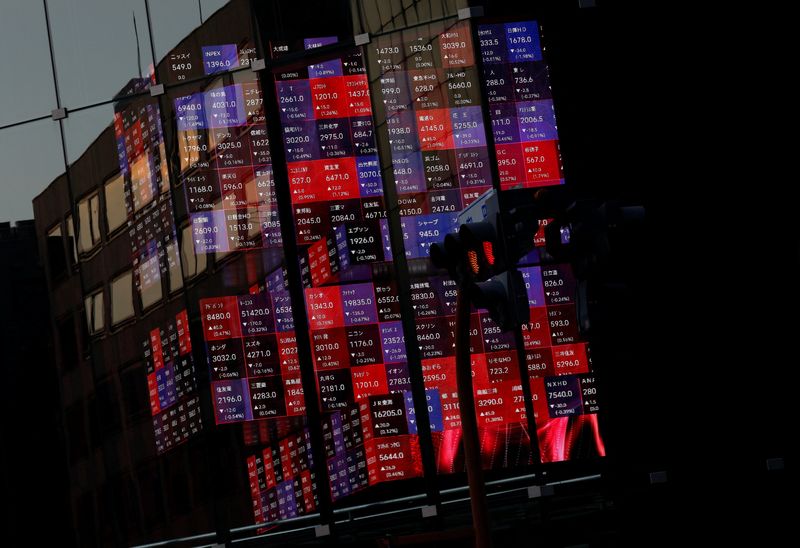By Stephen Culp
NEW YORK (Reuters) - The S&P 500 advanced on Thursday and benchmark Treasury yields hit their highest level since early March as robust economic data helped ease recession fears but increased the odds of the Fed keeping its restrictive policy in place for longer than expected.
Financials led the gainers after the Federal Reserve's stress test showed U.S. lenders have adequate capital to weather an economic storm.
Of the three major U.S. stock indexes, the Dow enjoyed the biggest gains while the tech-laden Nasdaq ended the session essentially unchanged, held in check by interest rate sensitive megacaps.
Smallcaps were clear outperformers, with the Russell 2000 surging 1.2%.
"What we have seen year-to-date is a very narrow rally that is occasionally punctuated by participation from the smaller stocks," said Michael Green, chief strategist at Simplify Asset Management in Philadelphia. "I believe we're ahead of where we should be, and most observers are perplexed by the failure of valuations to retreat."
A surprise drop in initial jobless claims and a sharp upward revision in first-quarter GDP underscored U.S. economic resilience and further cemented the likelihood that the Fed will raise interest rates at least once, and maybe twice more, this year.
"The continued strength in the economy has given the Fed a free hand to keep increasing interest rates without causing a recession," said Joseph Sroka, chief investment officer at NovaPoint in Atlanta. "Economic growth has been good and there's optimism that if the economy were to stumble, the Fed now has the ammunition to respond."
Financial markets have priced in an 87% probability that the central bank will implement another 25 basis point hike to the Fed funds target rate at the conclusion of its upcoming July policy meeting, according to CME's FedWatch tool.
The Dow Jones Industrial Average rose 269.76 points, or 0.8%, to 34,122.42, the S&P 500 gained 19.62 points, or 0.45%, to 4,396.48 and the Nasdaq Composite dropped 0.42 points, essentially flat at 13,591.33.
European shares closed higher as better-than-expected U.S. data, as well as signs of cooling inflation in Spain, helped calm jitters over a global economic slowdown and hawkish signals from world bank leaders.
The pan-European STOXX 600 index rose 0.13% although MSCI's gauge of stocks across the globe was flat.
Emerging market stocks lost 0.54%. MSCI's broadest index of Asia-Pacific shares outside Japan closed 0.62% lower, while Japan's Nikkei rose 0.12%.
Treasury yields rose, with 10-year yields touching their highest level since early March after economic reports painted a picture of a solid U.S. economy, promoting the "higher for longer" scenario with respect to restrictive monetary policy.
Benchmark 10-year notes last fell 34/32 in price to yield 3.8422%, from 3.712% late on Wednesday.
The 30-year bond last fell 55/32 in price to yield 3.9045%, from 3.804% late on Wednesday.
The dollar touched a two-week high against a basket of world currencies as upbeat economic data provided cushion to the Fed to continue raising rates.
The dollar index rose 0.42%, with the euro down 0.38% to $1.0869.
The Japanese yen weakened 0.22% versus the greenback at 144.82 per dollar, while sterling was last trading at $1.2611, down 0.23% on the day.
Oil prices posted modest gains as the solid economic data suggested strong demand and a steeper-than-expected drop in U.S. crude inventories.
U.S. crude rose 0.43% to settle at $69.86 per barrel, while Brent settled at $74.34 per barrel, up 0.42% on the day.

Gold prices steadied just above the key $1,900 level, its nominal gains hampered by the strengthening dollar.
Spot gold % to $1,907.46 an ounce.
